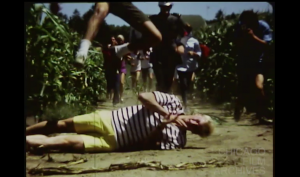
"The film depicts a Boy Scout's walk through a rural setting. He's later joined by a group of children who follow him through meadows and corn fields." Chicago Film Archives

"Un documental sobre las acciones plásticas de Raúl Tovar, pintor pop integrante del Salón Independiente, egresado –igual que Celestinos– de la ENAP. En él aparecen jóvenes con los cuerpos pintados de negro y las bocas rojas en algo parecido a un happening, la elaboración de un mural colectivo con frases icónicas de la época ("la imaginación al poder", "Peace", "Love", citas de Lao-Tse, etcétera). En la película predominaba un ambiente psicodélico que no llegaba más allá de la obra del pintor y del contexto juvenil en el que se producía" (Vázquez Mantecón, 2012).
"A documentary about the plastic art actions of Raúl Tovar, a pop painter member of the Independent Hall, alumni –same as Celestinos– of the ENAP. In it, young people appear with their bodies painted in black and their mouths painted in red in some sort of happening, there is also the making of a collective mural with iconic phrases of the time ("all power to the imagination", "Peace", "Love", quotes by Lao-Tse, etcetera). A psychedelic ambiance prevailed, not going beyond the work of the painter and the youthful context produced at the time" (Vázquez Mantecón, 2012).
"Narró en la cinta la reflexión existencial de un personaje que piensa sobre la relación entre los ideales genuinos y la realidad que lo rodea. En ella el tema político ocupaba un marco sutil pero presente. El título sugiere el regreso a un lugar donde el pensamiento comience de nuevo, sin supuestos previos. En la cinta de Belaunzarán aparecen mezclados varios elementos que perturban la reflexión del personaje: la propaganda política, Telesistema Mexicano, las imágenes sobre Vietnam, Biafra, Tlatelolco" (Vázquez Mantecón, 2012).
"The film was about the existential reflection of a character that thinks about the relationship between genuine ideals and the reality surrounding him. In it the political theme was a subtle framework, but it was present. The title suggests coming back to a place where thought begins again, without previous assumptions. In Belaunzarán's film there are several elements that disturb the reflection of the character: political propaganda, the Mexican Telesystem, images of Vietnam, Biafra, Tlatelolco" (Vázquez Mantecón, 2012).
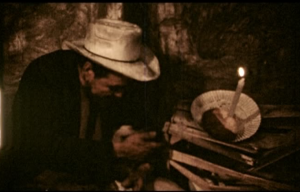
"Era una película muy sencilla, filmada al estilo de cine directo, que seguía los pasos y la vida de un personaje urbano singular: un hombre que acompañado de su perro recorre las calles de la ciudad, las barriadas miserables. La cinta lograba momentos de una gran intimidad al mostrar la vida de este paria solitario y marginal, como aquel en que comparte con su perro un pastel para celebrar su cumpleaños en la soledad de su cuarto" (Vázquez Mantecón, 2012)
"It was a very simple film, made in the style of direct cinema, that followed the steps and the life of a singular urban character: a man that in the company of his dog walks through the city streets, the miserable neighborhoods. The film achieved moments of great intimacy by showing the life of this lonely and marginal pariah, like the moment when he shares a cake with his dog to celebrate his birthday in the loneliness of his room" (Vázquez Mantecón, 2012)
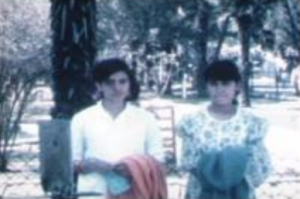
"Esta cinta se basaba en una idea de David Celestinos de enviar a diversos equipos de filmación a desarrollar historias sobre lo que ocurre un domingo en la Ciudad de México de manera simultánea. El resultado fue interesante, en la medida en la que muestra la cotidianidad dominguera de diversos personajes que provienen de distintas clases sociales: un borracho llega con su compadre a la casa de la vecindad y es recibido de mala manera por la mujer, un grupo de juniors pasa el día en Cuernavaca, un hombre solitario recorre las calles y parques del centro de la Ciudad de México, un velador se aburre en el edificio que custodia, dos sirvientas pasan el día en Chapultepec, una familia clasemediera que va a misa y a pasar un día de campo... La cinta sigue el planteamiento hecho por el neorrealismo italiano de no convocar actores profesionales para presentar historias sencillas, ligeramente dramatizadas" (Vázquez Mantecón, 2012.
"This film was based in an idea by David Celestinos of sending diverse filming crews to develop stories about what happens simultaneously on a Sunday in Mexico City. The result was interesting since it showed the Sunday everydayness of diverse characters from different social classes: a drunk man arrives at his friend's house in a poor neighborhood and is received in a bad way by a woman, a group of juniors that spend their day in Cuernavaca, a lonely man that goes through the streets and parks of Mexico City, a night watchman that is bored in the building he is in charge of, two maids that spend the day in Chapultepec, a middle class family that goes to mass and to have a picnic... The film follows the idea posed by Italian Neorealism of not using professional actors to present simple stories, slightly staged" (Vázquez Mantecón, 2012).
"Una historia en la que un grupo de estudiantes tomaban por asalto las instalaciones del Canal 8 de televisión en San Ángel para transmitir una proclama" (Vázquez Mantecón, 2012)
"A story in which a group of students take the facilities of the tv Channel 8 in San Ángel to broadcast a proclamation" (Vázquez Mantecón, 2012)
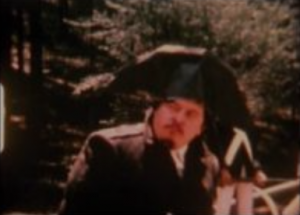
"Se trataba del regreso de un soldado de origen mexicano a la Ciudad de México después de haber combatido en Vietnam con las tropas estadounidenses. El hombre llega a la estación del ferrocarril de Buenavista y recorre la ciudad para acabar finalmente en el departamento de su hermano. Busca trabajo y no lo encuentra. Por la voz off que sigue el hilo de sus pensamientos, nos enteramos que a su mente guerrera le cuesta trabajo adaptarse a la vida pacífica. La película intercala una serie de secuencias oníricas que de alguna manera ilustran su delirio belicista: sueña que es un soldado griego que asesina al niño que lo molesta en el taxi colectivo (un pesero) que lo conduce a casa de su hermano; imagina en el personaje que lo entrevista cuando aplica para obtener un trabajo a Napoleón Bonaparte (interpretado por Juan José Gurrola) dirigiendo una batalla; o sueña que es un caballero medieval que asesina a su familia en un pacífico día de campo. Finalmente el personaje no encuentra cabida en la sociedad pacífica y acude –todavía en traje de caballero medieval – al aeropuerto para comprar un boleto de avión "a la guerra más próxima"" (Vázquez Mantecón, 2012).
"It is about the comeback of a Mexican soldier to Mexico City after fighting in Vietnam along with American troops. The man arrives to the train station in Buenavista y goes around the city to end up at his brother's apartment. He looks for a job and cannot find one. The off voice, that follows his train of thought, tells us that his war mind has trouble adapting to a peaceful life. The film inserts a series of dreamlike sequences that in a way illustrate his war delirium: he dreams he is a greek soldier that murders the kid that bothers him in a collective cab that drives him to his brother's house; he imagines the character that interviews him when he is looking for a job is Napoleon Bonaparte (played by Juan José Gurrola) directing a battle: or he dreams he is a medieval knight that murders his family in a peaceful day in the country. Finally the character doesn't find a place in a peaceful society and goes –still in medieval armor– to the airport to buy a by a plane ticket to the "nearest war" " (Vázquez Mantecón, 2012).
"Film is about sheep dog trials featuring sheep, dogs and people watching" Archives of Ontario.
"Film features an animated man and woman and a horse-drawn buggie" Archives of Ontario.
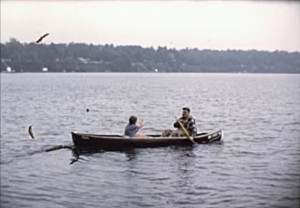
A married couple and a friend go on a fishing trip. The film shows them playfully preparing for the journey, driving to the lake, and partaking in fishing and canoeing.
Total Pages: 299